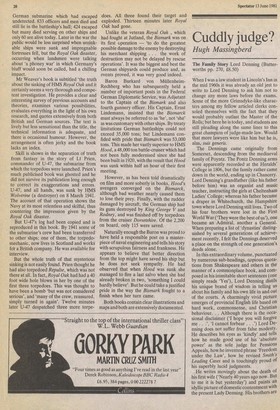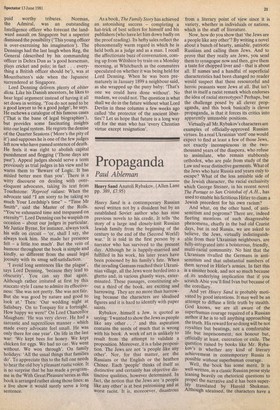Cuddly judge?
Hugh Massingberd
The Family Story Lord Denning (Butterworths pp. 270, £8.50) When I was a law student in Lincoln's Inn in the mid 1960s it was already an old jest to write to Lord Denning to ask him not to change any more laws before the exams. Some of the more Grimsdyke-like characters among my fellow articled clerks consoled themselves with the fact that they would probably outlast the Master of the Rolls; but here he is today, and students are still pleading along the same lines to this great champion of judge-made law. Would that more lawyers were like him but he is, alas, suis generis.
The Dennings came originally from Somerset, descending from the mediaeval family of Poyntz. The Pontz Denning arms were apparently recorded at the Heralds' College in 1806, but the family rather came down in the world, ending up in Chancery. Lord Denning's grandfather (like his father before him) was an organist and music teacher, instructing the girls at Cheltenham Ladies' College; whereas his father became a draper in Whitechurch, the Hampshire town where Lord Denning still lives. Two of his four brothers were lost in the First World War (`They were the best of us'), one became an Admiral, another a General. When preparing a list of 'dynasties' distinguished by several generations of achievement recently, I felt the Dennings deserved a place on the strength of one generation's deeds alone.
In this extraordinary volume, punctuated by numerous sub-headings, copious quotations from Shakespeare and others in the manner of a commonplace book, and composed in his inimitable short sentences (one simply reads 'Yes), Lord Denning distils his unique brand of wisdom in telling us about his family and his own life in and out of the courts. A charmingly vivid picture emerges of provincial English life based on hard work, commonsense, and Christian behaviour. . . Although there is the occasional disclaimer CI hope you will forgive me. . 'I cannot forbear. . .') Lord Denning does not suffer from false modesty. He describes his eyes as 'kindly' and tells how he made good use of his 'absolute power' as the sole judge for Pensions Appeals, how he invented phrase 'Freedom under the Law', how he revised Smith's Leading Cases and is touchingly proud of his superbly lucid judgments. He writes movingly about the death of his first wife (Nearly 40 years ago now. But to me it is but yesterday') and paints an idyllic picture of domestic contentment with the present Lady Denning. His brothers are paid worthy tributes. Norman, the Admiral, was an outstanding Intelligence officer who forecast the landward assault on Singapore but a superior dismissed the possibility (This young officer is over-exercising his imagination). The Dennings had the last laugh when Reg, the General (described by his commanding officer in Debra Dun as 'a good horseman, plays cricket and polo; in fact . . every thing a British officer should be), was at Mountbatten's side when the Japanese surrendered at Singapore, Lord Denning delivers plenty of °biter dicta. Like his Danish ancestors, he likes to hear legal argument instead of having it all set down in writing. 'You do not need to be a good lawyer to be a good judge', he says. He eschews a catalogue of his famous cases ('That is the bane of legal biographies), but provides some fascinating insights into our legal system. He regrets the demise of the Quarter Sessions ('More's the pity of it') and supposes he is one of the few judges left now who have passed sentence of death.
He feels it was right to abolish capital punishment and flogging (`Those days are past). Appeal judges should serve a term previously as trial judges in his view and he warns them to 'Beware of Logic. It has misled better men than you'. There is a Witty discourse on dealing with overeloquent advocates, taking its text from Touchstone: Reproof valiant: When the advocate said "I am sorry to be taking so much Your Lordship's time" — "Time Mr Smith", said the Master of the Rolls.
"You've exhausted time and trespassed on eternity", Lord Denning can be waspish on occasion — about our judges in particular, Mr Justice Byrne, for instance, always took his wife on circuit — 'or, shall I say, she always took him. She made her presence felt — a little too much'. But the vein of humour throughout the book is simple and kindly, so different from the usual legal Jocosity with its smug self-satisfaction.
avoid long sentences like the plague', says Lord Denning, 'because they lead to obscurity'. You can say that again. Although rather irritated at first by this staccato style I came to admire its effectiveness: 'She was not pretty. She was not fair. But she was good by nature and good to look at.' Then: 'Our wedding night at Salisbury. On to Torquay for a fortnight. How happy we were!' On Lord Chancellor Maugham: 'He was very clever. He had a sarcastic and supercilious manner — which made every advocate feel small. He was only there for one year'. On life in the last war: 'We kept bees for honey. We kept chicken for eggs. We had no car. We went without. We won through'. On family holidays: 'All the usual things that families do'. To appreciate this to the full one needs to hear the old boy's pleasant rustic voice. It is no surprise that he has made a programme in the`With Great Pleasure'series as this book is arranged rather along those lines; as a live show it would surely serve a long sentence, As a book, The Family Story has achieved an astonishing success — completing a hat-trick of best sellers for himself and his publishers (who have let him down badly on the proofreading). Its hefty sales reflect the phenomenally warm regard in which he is held both as a judge and as a man. I recall the affectionate buzz of conversation, coming up from Wiltshire by train on a Monday, morning, at Whitchurch as the commuters speculated on whether it was being held for Lord Denning. When he was born prematurely in January 1899 a neighbour said, as she wrapped up the puny baby: 'That's one we could have done without'. No madam, we could not. The question is what shall we do in the future without what Lord Devlin in these columns a few -weeks ago caned the protector of the ancient liberties'? Let us hope that future is a long way off for the man who has 'every Christian virtue except resignation'.







































 Previous page
Previous page